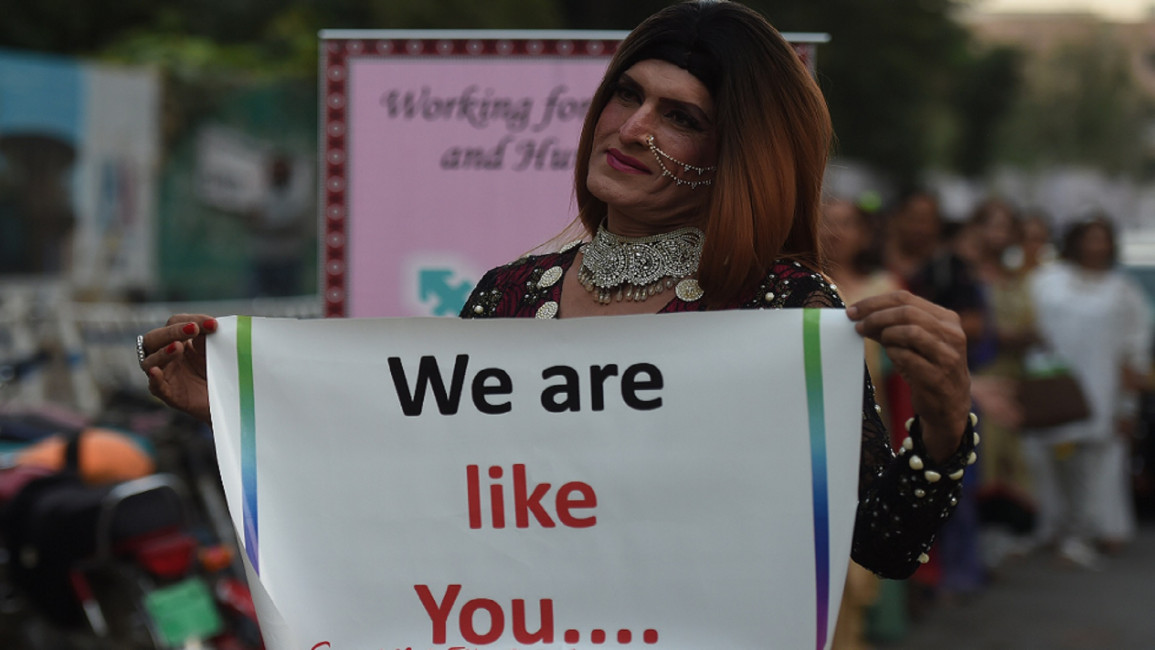Pakistan issues health cards for trans people in bid to improve care
Pakistan issues health cards for trans people in bid to improve care
Pakistan is issuing special cards to transgender people to prevent discrimination and plans to set up separate wards in hospitals is under way.
3 min read
A Pakistani transgender activist poses for a photograph [Getty]
Pakistan began issuing special health ID cards for transgender people on Tuesday as way to end health care discrimination.
Trans people have often been denied treatment in Pakistan because doctors could not decide whether to treat them in a male or female ward and have even died for lack of care.
The government plans to set up separate wards in hospitals around the country for transgender patients, according to Dr. Zafar Mirza, a special aide to Prime Minister Imran Khan for health services.
This is part of a wider move by Khan to launch a healthcare programme for the transgender community in Pakistan.
Speaking at a ceremony in the federal capital, Prime Minister Khan pledged change.
"We will take responsibility and extend this health card and insurance facility to the entire transgender community," he said.
"This government is accepting the transgender community – something that the previous governments had not done unfortunately."
Difficulties implementing his initial promises, Imran said, was due to administrative tie-ups left behind by the former regimes, and he criticised them for "pretending that the transgender communities do not even exist", and treating them like "non-persons".
"We will give you complete protection in society and abolish the unfortunate practices," he vowed.
Pakistan - a conservative, majority Muslim nation - officially recognised transgender as a third gender in 2012.
Yet transgender people are still largely confined to the margins of society, often taunted in public, ostracised by family and targeted in violent attacks.
Most transgender people in Pakistan are forced to survive by begging, dancing or prostitution. Sex reassignment surgery requires a court order, family approval, a psychiatrist's note and a medical recommendation.
The Supreme Court ordered the government to list transgender as a third gender on ID cards, and the national agency responsible for issuing them will also handle the new health cards.
The health ministry will immediately start giving health cards to all transgender people who are registered, said Dr. Mirza.
He said anyone who wants to change the listing on their ID to transgender will have a "one-time option" to do so. He didn't specify how long that period would last.
Speaking to reporters in the capital of Islamabad, he stressed that the government is legally responsible for ensuring all citizens' rights, including access to healthcare nationwide.
Transgender people face greater peril in more conservative areas of Pakistan, where Islamic extremists associate them with homosexuality and prostitution.
But there are also signs of progress. In 2018, Marvia Malik made history by becoming Pakistan's first transgender newscaster at just 21-years-old.
Pakistan is issuing special cards to transgender people to prevent discrimination and plans to set up separate wards in hospitals is under way.
Trans people have often been denied treatment in Pakistan because doctors could not decide whether to treat them in a male or female ward and have even died for lack of care.
The government plans to set up separate wards in hospitals around the country for transgender patients, according to Dr. Zafar Mirza, a special aide to Prime Minister Imran Khan for health services.
This is part of a wider move by Khan to launch a healthcare programme for the transgender community in Pakistan.
Speaking at a ceremony in the federal capital, Prime Minister Khan pledged change.
"We will take responsibility and extend this health card and insurance facility to the entire transgender community," he said.
"This government is accepting the transgender community – something that the previous governments had not done unfortunately."
Difficulties implementing his initial promises, Imran said, was due to administrative tie-ups left behind by the former regimes, and he criticised them for "pretending that the transgender communities do not even exist", and treating them like "non-persons".
"We will give you complete protection in society and abolish the unfortunate practices," he vowed.
Pakistan - a conservative, majority Muslim nation - officially recognised transgender as a third gender in 2012.
Yet transgender people are still largely confined to the margins of society, often taunted in public, ostracised by family and targeted in violent attacks.
Most transgender people in Pakistan are forced to survive by begging, dancing or prostitution. Sex reassignment surgery requires a court order, family approval, a psychiatrist's note and a medical recommendation.
The Supreme Court ordered the government to list transgender as a third gender on ID cards, and the national agency responsible for issuing them will also handle the new health cards.
|
The health ministry will immediately start giving health cards to all transgender people who are registered, said Dr. Mirza.
He said anyone who wants to change the listing on their ID to transgender will have a "one-time option" to do so. He didn't specify how long that period would last.
Speaking to reporters in the capital of Islamabad, he stressed that the government is legally responsible for ensuring all citizens' rights, including access to healthcare nationwide.
Transgender people face greater peril in more conservative areas of Pakistan, where Islamic extremists associate them with homosexuality and prostitution.
But there are also signs of progress. In 2018, Marvia Malik made history by becoming Pakistan's first transgender newscaster at just 21-years-old.
Pakistan is issuing special cards to transgender people to prevent discrimination and plans to set up separate wards in hospitals is under way.



